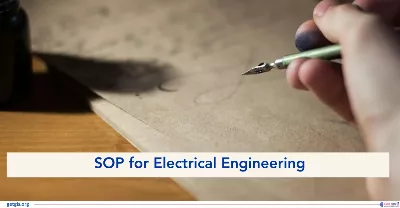Ultimate Guide to Master’s in Engineering in Germany in 2025-26
Updated On
-
Copy link
To pursue a Master's in Engineering in Germany in 2025-26, you can choose specialisations such as Mechanical Engineering along with that, Germany boasts Universities such as TU Munich, making it a perfect choice for international students.
Limited-time offer : Access a free 10-Day IELTS study plan curated for you

Table of Contents
- Why Study a Master’s in Engineering in Germany?
- Best German Universities for Engineering Master’s in 2025-26
- Eligibility for Pursuing a Master’s in Engineering in Germany in 2025-26
- Documents Required for Studying Master’s in Engineering in Germany in 2025-26
- Scholarships for Master’s in Engineering in Germany in 2025-26
- Job Opportunities After a Master’s in Engineering in Germany in 2025-26
- Navigate Your Path to Success in Germany with GetGIS
For a Master's in Engineering in Germany in 2025-26, you can choose from a wide range of specialisations, such as Mechanical Engineering, Civil Engineering, and Engineering Management, with options for both English- and German-taught programs. With its reputation for innovation and offering free or low-cost higher education to international students, Germany is a dream destination for aspiring engineers.
Universities such as TU Munich, KIT or TUBerlin blend theory with hands-on learning, allowing you to gain real-life experience in companies like BMW, Siemens, or Bosch.
Let us now walk you through the universities offering MS in Engineering in Germany, along with the eligibility criteria, job prospects, and more.
Why Study a Master’s in Engineering in Germany?
Pursuing a Master's in Engineering in Germany not only provides an excellent academic foundation but also opens doors to a vibrant professional landscape. Here are compelling reasons why choosing Germany for your engineering master's degree is a strategic and enriching decision.
- Germany boasts 3 universities in the top 10 for Engineering & Technology.
- Compared to other leading destinations, tuition fees at public universities remain remarkably low, with most programs costing €0-€20,000 per year.
- Over 80% of German universities collaborate closely with industry, offering unparalleled opportunities for internships, research projects, and career connections.
- Germany offers over 1,000 specialized Master's programs in fields like automotive engineering, renewable energy, and artificial intelligence, perfectly aligning with today's market needs.
- With an unemployment rate below 3%, graduates in Germany enjoy excellent job prospects and competitive salaries.
Also, read: Top 10 Benefits of studying in Germany for Indian Students in 2023
Best German Universities for Engineering Master’s in 2025-26
Pursuing a Master's in Engineering in Germany not only ensures a high-quality education but also provides access to cutting-edge research and industry collaborations. Here are five top universities in Germany renowned for their outstanding Master’s in Engineering programs.
|
Name of the University |
QS World University Ranking (2026) |
Type of University |
Tuition Fee (in EUR) |
|
Technical University of Munich (TUM) |
22 |
Public |
6,000 Per Semester |
|
Karlsruhe Institute of Technology (KIT) |
98 |
Public |
1,500 Per Semester |
|
Technical University of Berlin (TU Berlin) |
145 |
Public |
No Tuition Fees |
|
RWTH Aachen University |
105 |
Public |
No Tuition Fees |
|
Technische Universität Dresden |
218 |
Public |
No Tuition Fees |
Eligibility for Pursuing a Master’s in Engineering in Germany in 2025-26
To ensure a smooth application process, prospective students need to meet certain eligibility criteria. Here's an overview of the key requirements for pursuing a Master's in Engineering in Germany.
1. Educational Qualifications
Typically, applicants should hold a relevant Bachelor's degree in engineering or a closely related field from a recognized university. The degree should be equivalent to the German system, and it's essential to have a solid academic background to compete in the competitive admission process.
2. Consistent Grades and GPA
German universities often have specific GPA requirements for admission. While the exact GPA threshold can vary between universities and programs, a strong academic performance in your undergraduate studies is generally expected. Many programs may require a minimum GPA of around 3.0 on the German grading scale.
3. Language Proficiency
Since many Master's programs are taught in English, proficiency in the English language is crucial. Applicants are usually required to provide proof of English proficiency through standardized tests such as the TOEFL or IELTS. The majority of universities mandate German language proficiency at a B2 level, aligning with the Common European Reference for Languages. Nonetheless, certain institutions may necessitate a certification of a more advanced C1 level.
4. Entrance Examinations
Certain programs or universities may require applicants to take standardized tests or subject-specific entrance examinations. These tests may assess your knowledge of specific engineering disciplines and help determine your readiness for the Master's program.
5. Visa Conditions
Another crucial element of the eligibility criteria involves possessing a valid and sanctioned student visa for Germany, which is obligatory for all international students admitted to German universities. The visa application fee is 75 EUR, equivalent to approximately 6,000 INR.
Documents Required for Studying Master’s in Engineering in Germany in 2025-26
German universities maintain stringent standards in their admission procedures, and submitting a comprehensive set of documents is imperative for a successful application. Here is a breakdown of the key documents required to pursue a Master's in Engineering in Germany.
- Academic Documents: A notarized copy of your Bachelor's degree certificate, demonstrating successful completion of your undergraduate studies in engineering or a related field, and official transcripts detailing your academic performance throughout your undergraduate studies, including course titles and grades are required.
- Language Proficiency Documents: Proof of English proficiency through standardized tests like TOEFL, IELTS, or Cambridge English Proficiency, as required by the chosen university.
- Standardized Tests (if required): Some Master's programs may necessitate additional standardized tests, such as the GRE (Graduate Record Examination) or subject-specific tests. Ensure compliance with the specific requirements of your chosen program.
- Letters of Recommendation (LOR): Typically, two to three letters of recommendation from academic or professional referees, providing insights into your capabilities, achievements, and suitability for the Master's program.
- Statement of Purpose (SOP): A well-articulated Statement of Purpose outlining your academic background, research interests, and reasons for choosing the specific Master's program in Germany. This document helps the admissions committee understand your motivations and goals.
- Resume or Curriculum Vitae (CV): A comprehensive resume or CV summarizing your academic and professional experiences, highlighting relevant skills, achievements, and extracurricular activities.
- Passport and Passport-Sized Photographs: A valid passport with sufficient validity for the duration of your intended stay in Germany. Additionally, passport-sized photographs meeting the specifications provided by the German authorities.
- Visa Documents: The official acceptance letter from the university is a must. Plus, documentation proving that you have health and travel insurance coverage, as per German visa requirements is also required.
- Proof of Financial Means: Evidence of financial resources to cover your living expenses in Germany. This may include bank statements, sponsorship letters, or a blocked account in a German bank.
Scholarships for Master’s in Engineering in Germany in 2025-26
One significant avenue to support your academic journey is through various scholarships specifically tailored for students in the field of engineering. These scholarships not only alleviate financial burdens but also recognize and reward academic merit and potential contributions to the field.
Here's a comprehensive overview of scholarships available for Master’s in Engineering students in Germany
|
Award |
Eligibility Criteria (2025) |
Amount (2025) |
|
Deutschland Stipendium National Scholarship Programme |
|
€300 per month (for at least 2 semesters; renewals possible) |
|
Heinrich Böll Foundation Scholarship |
|
€850 per month (Master’s) + tuition fees Doctoral: Up to €1,350/month plus allowances |
|
DAAD Scholarships (Master’s/Doctorate) |
|
€934 per month (Master’s) €1,300 per month (Doctorate) Health insurance and travel/allowances provided |
|
Konrad Adenauer Stiftung Scholarships |
|
€934 per month (Master’s) for 2 years €1,200 per month (PhD) Supplement for health insurance/allowances available |
Job Opportunities After a Master’s in Engineering in Germany in 2025-26
Beyond the enriching academic experience, Germany offers abundant job opportunities for engineering graduates. Here's a comprehensive look at the diverse and promising career prospects awaiting Master’s in Engineering graduates in Germany.

|
Job Position |
Average Annual Salary (EUR) |
Average Annual Salary (INR) |
|
Electrical Engineer |
70,000 |
63,00,000 |
|
Energy Engineer |
68,000 |
61,20,000 |
|
Process and Application Engineer |
67,000 |
60,30,000 |
|
Project Manager |
80,000 |
72,00,000 |
|
Senior Mechanical Engineer |
77,000 |
69,30,000 |
Navigate Your Path to Success in Germany with GetGIS
In this guide, we've explored the academic landscape, eligibility criteria, document requirements, scholarships, job prospects, and top universities that make Germany a prime destination for engineering enthusiasts.
As you set forth on this exciting journey, it's crucial to have a trusted partner to guide you through the intricate immigration process. GetGIS stands out as the ideal immigration consultant, offering expertise, personalized assistance, and a proven track record in facilitating the transition for international students.
So, don't keep waiting. Book Your Free Consultation Today!
Limited-time offer : Access a free 10-Day IELTS study plan curated for you

Frequently Asked Questions
Is Germany good for Master’s in Engineering?
What are the best engineering specialisations in Germany?
Is a Master's in Engineering free in Germany?
Is a 7 CGPA good for an MS in Germany?
What is the salary after a Master’s in Engineering from Germany?





